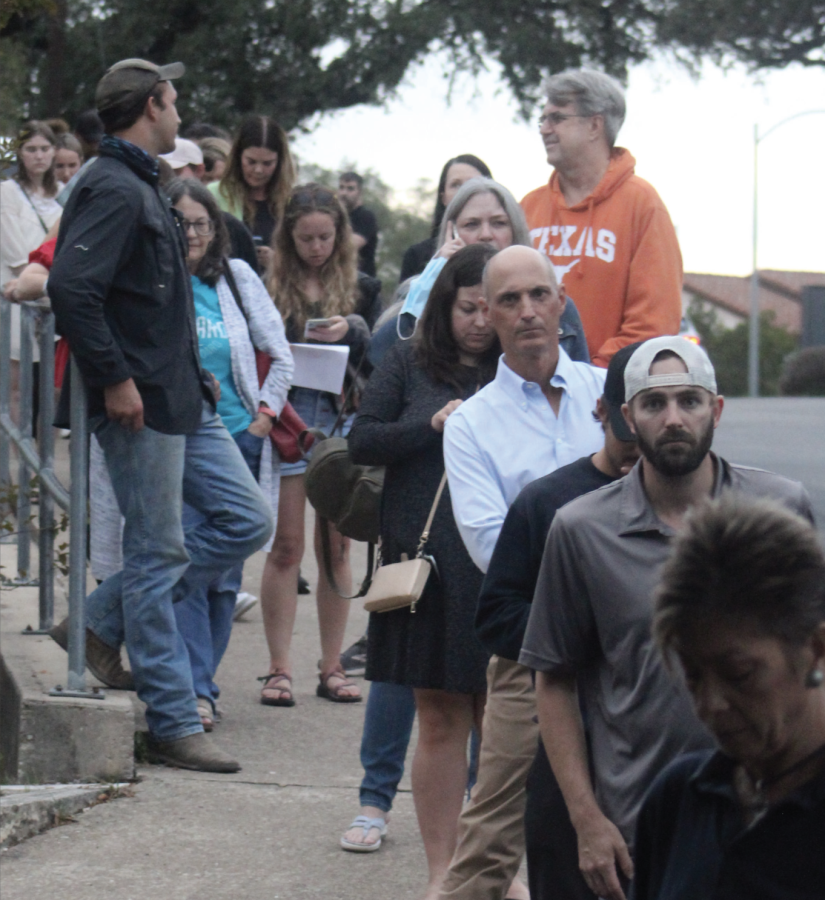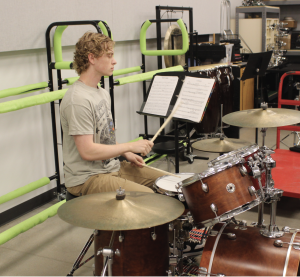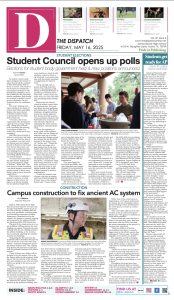Texans re-elect Governor Abbott
Gov. Abbott beat his opponent Beto O’Rourke with 54.8% of the vote
AWAITING THEIR TURN: Travis county voters wait in line at a local polling site in Circle C. Polling locations were open from 7 a.m. until 7 p.m. on Tuesday, Nov. 8 for non-early voting.
November 23, 2022
Reproductive rights, the Texas power grid failure, and the Uvalde school shooting. Those three major topics of concern weighed on his re-election campaign. Neck-and-neck with Beto O’Rourke’s campaign for months all across Texas, Governor Greg Abbott ultimately won the high-stake competition.
As voters absorbed the candidates debates, rallies, and commercials, Nov. 8 finally arrived and it was time to make a final decision for Texas. As the polling sites closed and the votes came in, Abbott took 54.8% of voters while O’Rourke took 43.8%. O’Rourke won the larger Texas cities and Abbott gained the smaller more rural areas of Texas pushing him over the edge and securing the race.
“I was not surprised by the result,” senior Colin Doles said. “Given that Texas is a historically red state, I think that a Democratic candidate would need to be more moderate to win, and Beto was just a little too far left to convince middle ground voters.”
During Abbott’s second term, he pushed for a voucher plan that would allow parents to choose between sending their child to a public or private school by funding private and charter schools with taxpayer dollars. During the campaign, O’Rourke claimed that Abbott tried to de-fund public schools while Abbott argued that pushing the voucher plan would not de-fund public schools.
“Funding has always been an issue for education,” AP Economics and Government teacher Ruth Narvaiz said. “Abbott has pushed for school choice which would allow money to be taken from what gets used on public schools and funnel that towards private or charter schools.”
After the overturn of Roe V. Wade, House Bill 1280 went into effect, signed by Abbott in 2021 making abortion illegal in Texas except without exception for incest or rape. Abbott hasn’t spoken a significant amount on the topic after the law passed.
“Abbott is likely going to further restrict reproductive rights in Texas,” senior Abby Alsup said. “Students should use their votes because while it may not seem like it makes a difference, every vote has the power to influence the policies in place and people in charge, especially at midterm elections because voter turnout is lower so your vote counts even more.”
Abbott only captured 27% of votes in Travis county, 45% in Hays county and almost turned the surrounding Williamson county blue with 51.2% of votes. In comparison, during Abbott’s first gubernatorial election in 2014, he won with a significantly higher amount of the Republican vote in counties surrounding Austin according to KXAN.com.
“I think [the Austin blue zone] is going to influence what’s going on around us with Williamson County in particular, because they have been solid red for a very long time,” Narvaiz said. “So I think as Austin becomes less affordable, you start to see that spread.”
O’Rourke’s campaign gained a particular amount of traction and support this election after losing previous elections for senator, president, and governor. Speculation of whether he will run for a higher, national political position or fade from popularity transpire.
“The next seat that’s open is John Cornyn’s seat in the Senate and he ran against Ted Cruz and he could challenge Cornyn, but I would be surprised if he ran for president, I don’t think he would do that but I don’t think he’s going away,” Narvaiz said. “He did really well for a Democrat in Texas, he had a huge campaign, he collected a ton of money, and he got a lot of votes.”
According to the Texas Ethics Commission, O’Rourke raised $6,000,000 more than incumbent Abbott during the campaign.
“Beto will still have a successful career in politics, it just might not be at as high of a level as senate or governor,” Doles said. “I wouldn’t be surprised if his policies shifted slightly to accommodate more middle ground voters”

However, all local races turned Democratic with Democrats Lloyd Doggett and Greg Casar winning the U.S. House District seats 35 and 37 which cover east and central Austin. Both will strive to restore abortion rights and create affordable housing in the growing Austin.
“Elected officials will be in charge of key issues that affect students, such as district funding, as well as human rights and other issues that directly affect students,” Doles said.








